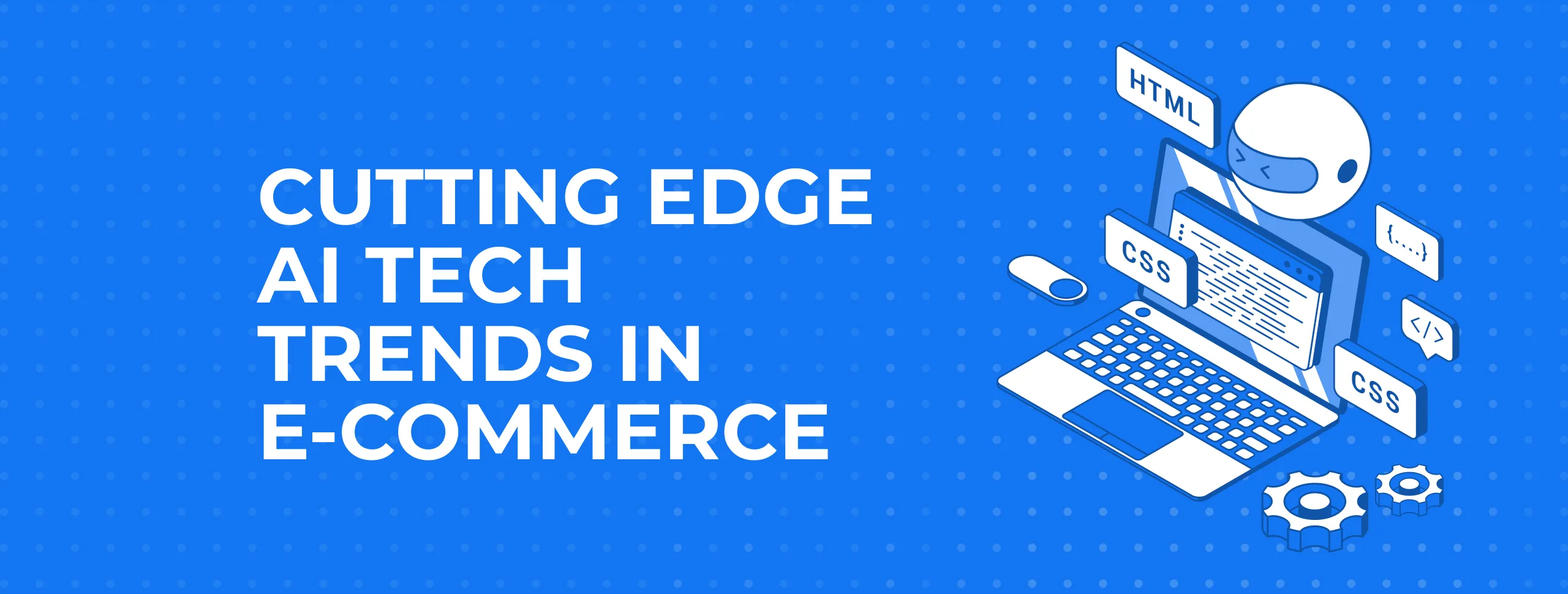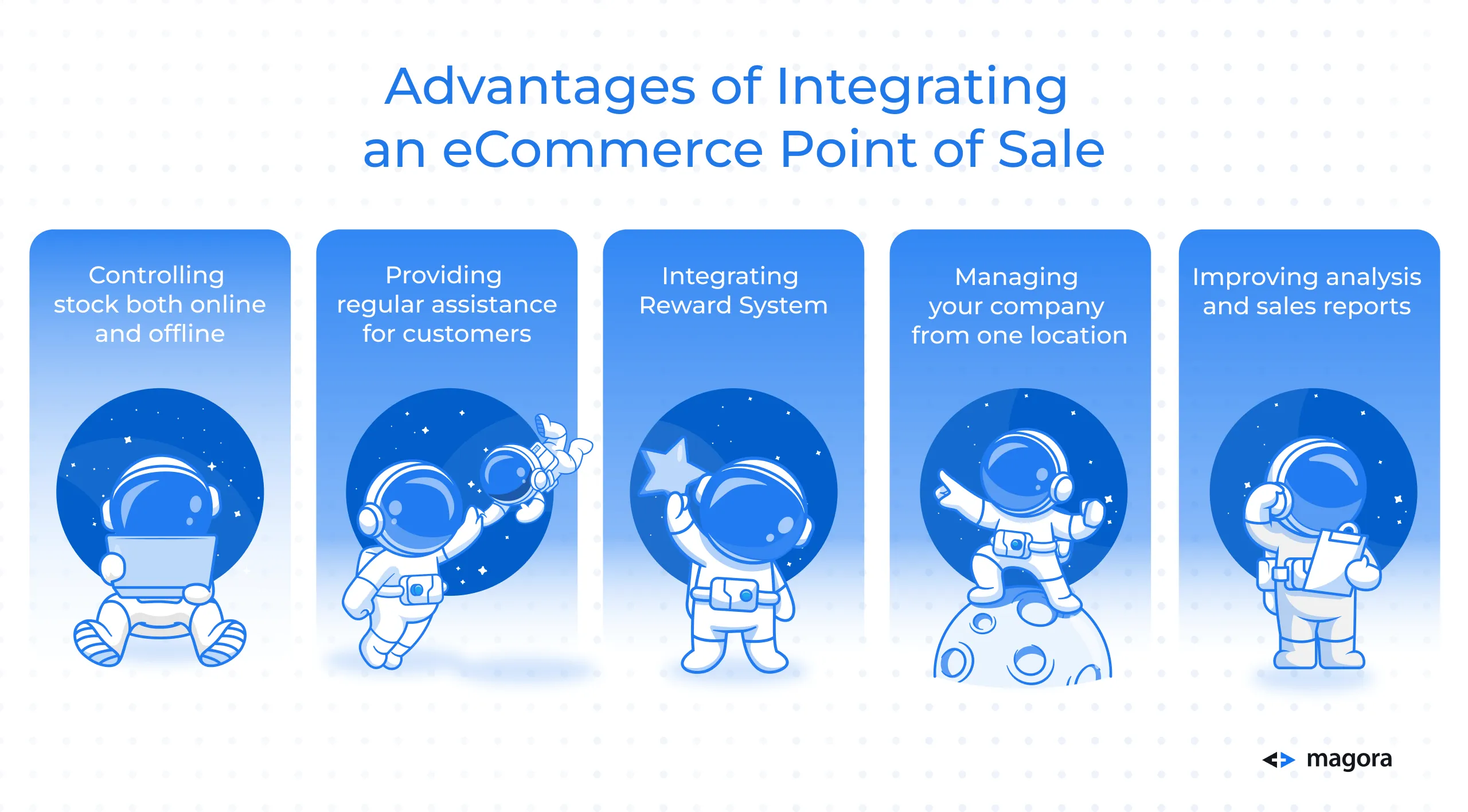
Cutting Edge AI Tech Trends in E-Commerce

Table of contents
- Cutting-Edge AI tech Developments in E-Commerce
- Artificial Intelligence in E-commerce Market Size
- Machine Learning in E-commerce
- Artificial Intelligence in E-commerce
- Logistics and Delivery with AI Automation
- Internet of Things in E-Commerce
- Smart Logistics
- Customized Retail Ideas
- Artificial intelligence implications in online shopping
- Computerized Intelligence in Internet Retail
- POS and E-commerce
- Advantages of Integrating an e-Commerce Point of Sale
- Conclusion
Cutting-Edge AI tech Developments in E-Commerce: Changing the Nature of Virtual Buying
Machine learning (ML) and artificial intelligence (AI) are leading the way in these revolutionary developments that are constantly changing the world of e-commerce. The way internet merchants conduct business and engage with their customers is being completely transformed by this innovative technology. The most notable AI technology developments that are transforming the e-commerce sector are examined in this article.
Online shopping has limitless promise in the future, but staying up to date with the newest trends and advancements can also provide a significant problem for both consumers and online companies.
Artificial Intelligence in E-commerce Market Size
Remarkable statistics support the increasing popularity of artificial intelligence in online shopping. The worldwide market for e-commerce powered by artificial intelligence is expected to develop with a 15.7 per cent of annual growth rate over the following eight years, eventually reaching $16.8 billion in 2030. Moreover, a particularly popular use of artificial intelligence in advertising and sales remains customer-service data analysis, as reported by 57% of those surveyed in developing countries.
According to the most recent data in 2022, online sales are predicted to increase up to 7.3 trillion US dollars by 2025, which would increase the market value of AI within the retail sector from 1,714.3 million US dollars in 2021 to 36,462.5 million US dollars by 2030.
The application of machine learning in online shopping has spread to different areas of corporate operations and administration. Systems based on artificial intelligence are increasing revenue by optimizing workflows across a range of industries, including marketing, client service, logistics, and managing stocks.
Even though AI capabilities have already advanced significantly, new features are still being developed and instantly integrated.
Facial recognition
Facial recognition systems for self-service kiosks is a logical step forward. Artificial intelligence in recognition of facial features has great potential for identifying gender, age, and various other characteristics that can influence what a person might order at a given time.
By using an individual's profile to identify them, facial recognition technology is able to remember their past purchases, provide targeted recommendations, and boost revenue and security while offering an improved customised service.
Voice Ordering
Today, many people use virtual voice help on their cellphones, and the percentage is still growing. Soon, interactive shopping terminals using modern artificial intelligence for noise reduction will make their way onto the market. Such artificial intelligence point-of-sale systems can interact with shoppers at an advanced level (and completely hands-free).
A voice-assistant system is noticeably preferred by customers since speaking is the most natural way of communicating. This highlights the advantages of conversational AI and its potential uses in dining establishments, emphasising the groundbreaking potential of this soon-to-be innovation.
Machine Learning in E-commerce
The engine powering recommendation systems is machine learning. Machine learning algorithms evaluate consumer behavior and tastes to recommend products that will most likely interest customers. The rates of conversion rise and customer satisfaction is greatly improved by this tailored strategy.
Applications of machine learning (ML) include citizen science, weather prediction, and detecting fraud with credit cards. The ongoing development of machine learning and artificial intelligence provides fascinating scientific answers for commercial challenges, provided that there is sufficient information available for developing machine learning models.
Artificial Intelligence in E-commerce
AI has a broader role in e-commerce, from chatbots offering customer support to predictive analytics that forecast demand, optimize pricing, and manage inventory. Virtual shopping assistants are becoming more sophisticated, helping users make informed purchase decisions.
Incorporating AI solutions combined with ML, as part of your online retail strategy, will significantly improve your customer experience, boost conversion rates and business revenues. E-commerce strategists can deploy an AI / ML combination in order to automate a wide range of tasks, essentially reducing manual workload related to the operation and maintenance of e-commerce sites. AI and ML can maximize sales by learning from user behavior in real-time, predicting intentions and unique preferences, as well as recommending relevant products in a higher ranking.
Logistics and Delivery with AI Automation
In e-commerce, effective shipping and logistics procedures are essential. Automation with artificial intelligence has been improving door-to-door shipping, cutting the duration of delivery, and simplifying the planning of routes. Transportation businesses may now make informed choices for more economical and environmentally responsible shipments thanks to artificial intelligence algorithms.
AI automation in logistics can take many different forms, including:
- Implementing robots for storage tasks
- Optimizing delivery vehicle routes
- Streamlining management of returns
- Computerizing examination of data
- Using analytical prediction to control inventories
1. Management of warehouses automatically
Storage facilities are also changing because of AI-powered technology. The organization of inventory is optimized by intelligent algorithms and robotic devices that select and pack things. These developments improve efficiency of operations and decrease human factor.
2. Self-Driving Means of Transportation
Autonomous vehicles are increasingly being used for delivery. Drones and autonomous trucks with artificial intelligence are cutting delivery times and costs and lowering carbon emissions.
3. Computerized Processing of Returns
Returning goods is often a difficult and expensive procedure to handle. Through evaluating the quality of returned goods and estimating their potential for sale worth, artificial intelligence accelerates returns and minimizes expenses.
4. Streamlined Processing of Information
Online shopping information management is the process of doing activities automatically through the use of software programs rather than by hand. The focus is normally on monotonous, manual duties like taking orders for customers.
Database connections, automated marketing technologies, and artificial intelligence (AI) are examples of automation.
5. Predictive analytics to control inventories
The issue of overstocks and out-of-stocks has always existed in the retail sector. In recent years, there has been a notable boost in demand for e-commerce technology and optimization methods, which can be attributed to this. Predictive analytics solutions, on the other hand, have taken centre stage in the world of retail technology and revolutionized the way that top merchants handle their stocks.
Internet of Things in E-Commerce
IoT has an essential part in online shopping. Goods are kept fresh and in available thanks to IoT-enabled stock control solutions and smart shelves. Furthermore, if something runs out, IoT-connected household gadgets have the ability to place new orders.
Smart Logistics
Artificial intelligence and real-time information are used by smart logistics to maximize efficiency in the supply chain. The system contributes to quicker times for delivery, tracks stocks, and foresees interruptions. It's revolutionary for big online retail companies.
Customized Retail Ideas
To provide personalized product recommendations, artificial intelligence systems examine a user's past searching and purchasing activity. Increased customer contentment and commitment are the results of such customization.
Artificial intelligence implications in online shopping
- Using Online Fitting Rooms: Artificial intelligence improves the online clothes purchasing process by enabling users to virtually try on accessories and clothing.
- Enabling Visual Search: This feature makes it easier for customers to find what they are looking for or something similar by allowing them to upload photographs.
- Activating Dynamic Pricing: To ensure cost-effectiveness, artificial intelligence algorithms modify cost in response to market conditions and rivalry.
Computerized Intelligence in Internet Retail
Artificial intelligence is improving the efficiency and convenience of virtual purchases. There are many examples of how artificial intelligence (AI) is changing the e-commerce scene: starting from voice-controlled shopping and automatic reordering, and ending with chatbots for client service.
POS and E-commerce
The retail business has seen significant transformations as a result of AI-enabled, improved point-of-sale systems. Machine learning has been applied for effective inventory management; data management and computer vision have also found many uses.
People continue to choose buying things in real shops, even though their propensity towards internet purchasing has significantly increased. A new poll discovered that 81% of consumers who want to buy costly items would rather examine them personally prior to making a decision to buy them, compared to almost 59% of customers who choose to go to a retail location to make a purchase. This indicates that customers still value their shopping experiences.
An increasing number of companies are placing a strong emphasis on boosting the entire shopping process due to the increasing importance of advancing the customer experience. Businesses may obtain important insights by gathering and analyzing vast volumes of consumer information by integrating artificial intelligence into their point-of-sale (POS) devices. Artificial intelligence is a way to incorporate automation and enable immediate analysis of data from multiple contact points for point-of-sale systems.
Advantages of Integrating an E-Commerce Point of Sale

There are unquestionably numerous advantages to integrating an offline business and eCommerce. Two independent operations that are incompatible with each other create errors and misunderstandings, which eventually detracts from the quality of work performed by staff members and your reputation among the customers.
1. Controlling stock both online and offline.
Handling all of your stock from one place is just one of the biggest benefits of connecting your point of sale system with your online store. This makes it easier to monitor stock levels and guarantees that your company will never undersell or go out of supplies. Mechanical stock-take is no longer necessary thanks to instantaneous synchronization, which also reduces mistakes and saves time.
2. Providing regular assistance for customers
While buying things, people prefer using a variety of touchpoints. The consumer's experience is no more linear—it starts with a web browser and ends with in-person product pickup. This implies that keeping clients happy during their purchase process is essential. Shoppers can experience the advantages of shopping online, delivery to the store, as well as returns of items at an actual shop having a point of sale. This adaptability raises client loyalty and promotes long-term relationships with customers.
3. Integrating Reward System
There is a way to set up just one loyalty program that applies to digital and physical shopping- with the help of POS in both cases. So customers keep getting bonuses or using them no matter where they buy something: online or in a physical store. They just need to provide their email address or other information in order to get access to their loyalty points.
Ultimately, unified loyalty programs improve the consumers' engagement and increase their desire to establish a relationship with your business through every possible channel.
4. Managing your company from one location.
With a back office that is integrated with e-Commerce and POS, you can get all the information you require. If the programs were not linked, you would need to independently search for information via various companies and networks. Whereas when you have a system that is fully integrated, it is possible to check staff members, to analyze revenue, stock, and report information on a single platform. Regardless of your location, you can always obtain the latest data because it gets updated instantaneously.
5. Improving analysis and sales reports
To make smart company choices, it is necessary to implement comprehensive sales data, offered by point-of-sale (POS) systems. With this system you can examine behavior patterns of customers and pinpoint best-selling items. You may also improve your advertising plan and offered products.
Conclusion
In order to give clients a more tailored, effective, and smooth purchasing experience, the e-commerce sector incorporates machine learning and artificial intelligence. It is essential to anticipate much more fascinating advancements in the realm of internet shopping as such innovations keep evolving.
When it comes to point-of-sale (POS) systems: as companies transition toward a digital-only company structure, old or classical POS equipment will gradually become outdated. Simply by adopting internet-based electronic technologies, your hotel's operations will have a lead in the market over competitors that are slow to adapt it.





